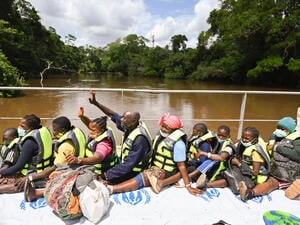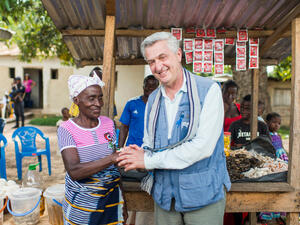Liberia repatriation
Liberia repatriation
One of UNHCR's largest voluntary repatriation efforts in West Africa is due to get underway on Friday, 1 October with the launch of a three-year programme to return home some 340,000 Liberian refugees scattered throughout the region during 14 years of civil war.
On Monday the Liberian government and UNHCR signed three separate tripartite agreements with the governments of Guinea, Sierra Leone and Côte d'Ivoire to set the main legal and operational frameworks for the return of the refugees. Last week, on 22 September, a similar agreement was signed for the return of refugees from Ghana.
Two weeks ago, the Liberian government declared four of its 15 counties safe for return. The counties are Grand Cape Mount, Bomi, Gbarpolu and Margibi in the west and north-west of the country. The key benchmarks for safe return include completion of disarmament and the presence of civil authorities, reasonable spontaneous returns by refugees, ongoing rehabilitation of basic services and unhindered access by humanitarian workers. At this point, UNHCR is only facilitating returns to safe areas in Liberia. Mass information campaigns have been carried out for refugees both in urban areas and camps of asylum countries concerning current conditions in Liberia so refugees can make an informed decision about returning.
The first convoy of refugees from eastern Sierra Leone is planned to leave Gondama and Tobanda camp later this week on a three-day 228 kilometre journey crossing over into western Liberia at Bo Waterside on 1 October. The long journey is due to poor road conditions. From Ghana, a flight of over 100 refugees is due to fly from Accra to Monrovia also on Friday. Convoys from Guinea will start arriving on 4 October.
On arrival, returnees will spend a couple of nights in transit reception centres before returning to their areas of origin, where they will get water, cooked meals and health care and HIV/AIDS information. They will receive repatriation packages of four months food rations from WFP, plastic sheeting, shelter kits, jerry cans, kitchen utensils, blankets, soap, water, buckets, personal hygiene items and agricultural tools for those returning to rural areas.
Liberia suffered enormous destruction during the war and UNHCR has been assisting with community-based projects in return areas to rehabilitate basic services including school buildings, roads, shelter, water and sanitation systems. Funding is crucial for the repatriation to succeed - but so far UNHCR has less than half of the $39.24 million it needs for this year.
Once in full swing, the repatriation will use air, sea and land routes to get refugees home. UNHCR is planning for the return of 100,000 refugees this year - including spontaneous returnees and those who make their way home with UNHCR assistance. Already this year some 50,000 Liberians have returned of their own accord, often using unsafe transport. Our voluntary repatriation provides a safe and dignified return for refugees.
Liberian refugees in asylum countries as of December 2003: Guinea - 149,000, Côte d'Ivoire - 74,200, Sierra Leone - 67,200, Ghana - 42,400, Nigeria - 6,000, Gambia - 750, Others (including Senegal and Mali) - 1,150. There are an estimated 500,000 internally displaced people in Liberia.
UNHCR planning figures for repatriation: In 2004 - 100,000; 2005 - 154,000; 2006 - 65,000.







